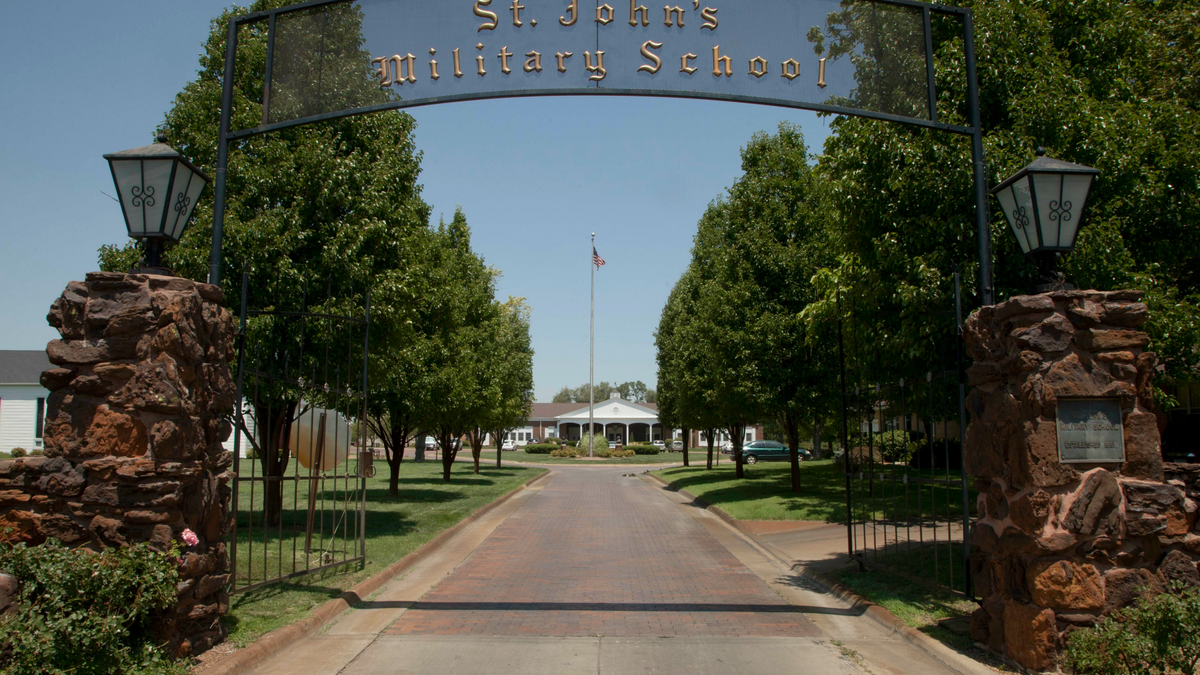
FILE - This June 27, 2012, file photo, shows the the entrance to St. John's Military Academy in Salina, Kan. Nearly seven months before publicly announcing its plans to close, the embattled Kansas military school amended its articles of incorporation to remove the Episcopalian church that founded it from receiving its property upon its demise. The Episcopalian boarding school announced in February it planned to shut down after its May 11 commencement. The 131-year-old school said education has changed dramatically, resulting in lower enrollment and unsustainable higher costs. (AP Photo/Orlin Wagner, File)
WICHITA, Kan. – Nearly seven months before publicly announcing its plans to close, an embattled Kansas military school amended its incorporation document to remove the Episcopalian church that founded it from getting the property once the school shuts down.
The revelation came when the document, signed by the school's president last year and filed with the Kansas secretary of state's office, recently became public. It was brought up in an alumni group's social media posting and has raised questions at a time when supporters are working to keep St. John's Military School in Salina open.
The Episcopalian boarding school announced in February it planned to shut down after its May 11 commencement. The 131-year-old school for boys in grades 6 through 12 said at the time "the landscape of education has changed dramatically," resulting in lower enrollment and unsustainable higher costs of education. It claimed it had unfairly become a target for litigation and negative media portrayals.
The school has been dogged over the years by litigation alleging it failed to properly supervise cadets and that its practice of giving higher-ranking cadets the power to discipline younger ones encouraged a culture of physical and mental abuse.
Military schools nationwide have been closing their doors amid declining revenues and falling enrollments. At least three others have announced closures in recent years in Missouri, Pennsylvania and Indiana.
St. John's did not release its enrollment numbers.
The school amended its articles of incorporation to remove the Protestant Episcopal Church of Western Kansas from getting the property once the school closes. The school's new bylaws — signed on July 27, 2018, by school president William Clark — stipulate that once its liabilities are paid and any donor instructions followed, the remaining assets would go to the St. John's Military School Endowment Fund or another nonprofit group with a similar charitable mission. St. John's endowment fund was formally dissolved last week, according to a filing at the secretary of state's office.
This is a change from amended bylaws filed in April 1994 that specified those assets should go to the Protestant Episcopal Church of Western Kansas or the bishop of the diocese of that church. Its founding 1888 document also said its property could not be transferred without the written consent of the bishop.
It is uncertain what will happen to the school's facilities. Clark did not respond to a request for comment and current Bishop Mark Cowell downplayed the disagreement.
"We are kind of hoping they will find a way to not close, but right now it doesn't look like that is an option," Cowell said. "If they end up closing, I think that we understand we have positions as to who it belongs to and I think we are working on resolving those.
"But there were a lot of people who thought that we were at odds and we are not," he added. "We've enjoyed working with St. John's for a long time and I think the dispute between us has really gotten somewhat inflated."
The church is still interested in having a military school on the Salina campus, but the bishop said he doesn't know if anybody can purchase it for that purpose. If not, he said the church plans to work with the school to find a good use for the property. The school has said it needs to raise $20 million to cover capital improvements and other costs to stay open.
"The trustees are still working this out and the property is still under their control, so right now I am letting them handle it," Cowell said. "I think they are doing a good job."
Neither the school's attorney, Peter Johnston, nor two trustees contacted by The Associated Press responded to questions about why the school amended its articles of incorporation last year.
However, an email from Johnston to a former cadet that is posted on an alumni group's Facebook page argued the change was spurred by the church's desire to end any formal affiliation with the school after it was named as a defendant in at least one lawsuit against the school.
In the latest litigation, an arbitrator ruled in December that the school failed to adequately supervise cadets entrusted to its care and intentionally inflicted emotional distress in 2014 on a bullied 11-year-old student who had been physically tied together with his harasser in public as punishment. Shortly thereafter, the boy was allegedly raped and sodomized by his harasser in the dorm. St. John's didn't respond to requests for comment on the case.
Cowell said that while the church didn't have any oversight of St. John's when the lawsuits were filed, and believed it should not be named as a defendant, that is not the same thing as not having an interest in the school.
The nonprofit corporation's tax documents show that by the end of May 2017, St. John's Military School was running $1.71 million in the red — bringing in revenues of nearly $4.7 million at the same time it racked up expenses of more than $6.4 million. The school also valued its assets that year at $9.48 million, with liabilities of $11.2 million listed.







































